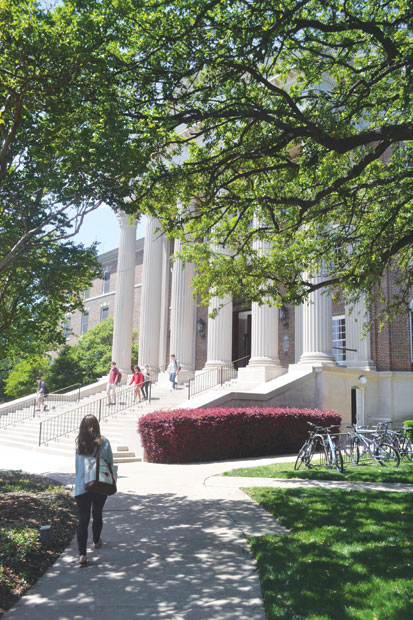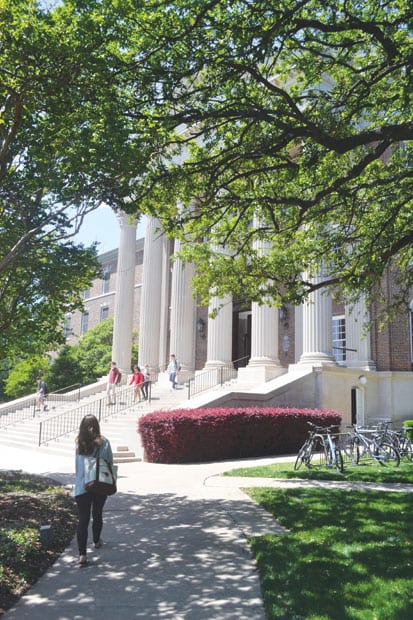Students took to a social media app, using anti-gay slurs to defeat a vote that would have added an LGBT seat to the student Senate

YES H8 | Students stroll in and out of SMU’s Dallas Hall during the week before finals. Several of them talked about homophobic attacks on Yik Yak, a social media app. (Steve Ramos/Dallas Voice)
DAVID TAFFET | Staff Writer
Southern Methodist University students littered a recent vote with hate speech that showed how deeply some of them despise the LGBT community. Rants appeared on Yik Yak, a social media app where people can comment anonymously, when the students were voting whether to include an LGBT seat on the student Senate.
“Homosexual isn’t a race its a fucked up way of life,” one student posted on Yik Yak. “Yeah, I’m homophobic. So what?” another student fired off. And there were more. “Fuck fags” also was among the numerous posts.
Yet, there is no firestorm of protests to match those created by another hate-generated tirade. Los Angeles Clippers owner Donald Sterling was banned from the NBA on Tuesday, fined $2.5 million and is being pressured to sell his team after he was recorded making racist comments. On the SMU campus, however, the students’ anti-gay rants have barely stirred the manicured azaleas.
“To me that just shows that it’s OK to hate gay people and say anything you want about them, but you can’t say anything hateful about other groups,” said Glenda Long, who was eating lunch at a restaurant on Cedar Springs Road. “It’s just not right that people say such hateful things about us, and no one cares. But then that basketball team owner says something racist, and everyone wants his head on a platter. Where’s the concern for our community?”
One SMU student was concerned. Dillon Chapman had been documenting the anti-gay comments for weeks, and he said he noticed the number of comments increased as the vote approached. He said he stopped doing it after other students accused him of “cheapening the level of discourse.”
SMU has other minority seats that represent its African-American, Asian, Hispanic, foreign and tranfer students, but attempts to add an LGBT seat have failed repeatedly. In April, the student Senate voted 43 to 3 to create the seat, but the student body voted against changing the student constitution.
The measure’s supporters rallied and collected more than the 10 percent of student signatures needed for a revote. It failed by an even greater margin than the first vote.
Carl McClain, one of the 1,000 students who voted against creating the LGBT seat, said homophobia didn’t influence his vote. He didn’t vote in the first election because he couldn’t make up his mind, but he voted “no” in the revote because he felt students should have accepted the results of the first vote.
“Our student constitution is currently silent on the issue on re-votes, and it was through this kind of technicality that a second ballot was pushed,” McClain said. “I understand that the re-vote proposal emerged from several student senators, though LGBT-friendly organizations eventually endorsed the idea.”
When the anti-gay slurs appeared, encouraging students to vote against the measure, the university’s newspaper, The Daily Campus, devoted its editorial page to the Yik Yak controversy.
“The app is, of course, not responsible for homophobia on campus, but it has brought those sentiments to the forefront, clearly demonstrating to the university the deep-seeded hate a large number of students have against persons identifying as lesbian, gay, bisexual or transgender,” the editorial board wrote. The editorial further explained that the hateful, anonymous comments that encouraged students to vote against the LGBT seat are exactly the reason the seat is needed.
In the same issue, SMU President Gerald Turner wrote a letter, condemning the “disrespectful anonymous comments” posted on social media. He called the reports “extremely troubling” and said they violate the Student Code of Conduct.
“When students violate these values through anonymous social media comments, they are harming our community and, we believe, themselves,” Turner wrote.
Sammi Partida, a junior at SMU, says he has ideas to resolve the problem, but when he contacted Turner’s office, he was given a copy of the president’s letter.
“It was good that he was taking note, but a letter won’t cut it,” Partida said. “The newspaper is something that we can all read, feel good about, but at the end of the day, where does it end up? Discarded in a box somewhere.”

CLASSLESS | SMU students took to social media to hurl anti-gay slurs during a recent vote to add an LGBT seat to the student Senate. (Steve Ramos/Dallas Voice)
Partida said he’d like to see funding for the Women’s and Gender Studies program increased to allow for more events and programming. He also said sexual orientation and gender identity should be addressed to allow for more events and programming. Professors, he suggested, could address the issue for a few minutes throughout the semester, especially at times such as the LGBT Senate seat vote or when anti-LGBT incidents occur on campus.
While professors in the gender studies program probably have addressed the Yik Yak comments, Partida doesn’t believe professors at the Cox School of Business have. A lesson might be framed in terms of how unacceptable the anti-gay slurs are in a corporate setting.
“Whether it’s in the workplace, on social media or the company’s intranet sites, we do not tolerate discrimination of any sort, including that based on sexual orientation or gender identity, age, race gender, ethnicity, religion or national origin,” an AT&T spokesman said. “Our social media standards for employees point out explicitly that conduct that is prohibited in the workplace (discrimination, bullying or harassment) also is prohibited in the digital space.”
Turner suggested in his letter that students who feel victimized have resources available to them, including the campus police. Partida, though, doesn’t give that any weight. He said he reported an incident to police when he felt threatened by other students who were calling him homophobic names. The police, he said, told him it didn’t warrant an investigation. Several weeks ago, it happened again, he said. Then, three students who Partida said were drunk, followed him on campus at night and called him a “faggot.” He said he didn’t bother to report it because campus police didn’t do anything the first time.
The lack of action by campus police concerns James Tate, Community Relations Consultant with the Dallas County District Attorney’s Office.
“Situations like these are unfortunate but an everyday reality for some students,” he said. “This is why education and awareness are crucial. What we know is that many times acts of violence begin with name calling and other forms of bullying, and we should avoid a spark turning into a flame. The district attorney’s office is committed to victims of any crime, and we are here to help.”
The campus police said they do take those incidents seriously.
“We do take these kinds of reports and would refer the case to the SMU student conduct office for investigation as possible violations of the student code of conduct,” said SMU Chief of Police Richard Shafer.
So given the outrage volleyed at Sterling for his racist comments, shouldn’t people, especially LGBT people, direct a similar demand for accountability at SMU? LGBT Sports Coalition spokeswoman and ESPN.com editor Christina Kahrl sees a connection between Sterling’s racist remarks and the SMU students’ homophobic posts. She said the national attention Sterling’s comments attracted reflects how engaged people are with sports, but she noted that the anti-gay slurs on Yik Yak are equally offensive. However, many people don’t feel homophobic comments are relevant to them.
“This kind of backlash shows the need for their inclusion even more and shows serious concern for their safety,” Kahrl said.
Yik Yak CEO Tyler Droll and COO Brooks Buffington said in a statement that “Yik Yak is an anonymous app built to foster responsible interaction and build networks in hyper-local areas. While most of the posts and activity is positive, we make every effort to ban offensive or abusive use of the app. When an inappropriate comment is posted, we can suspend and ultimately ban users from communicating on Yik Yak.”
Yet, no SMU student was banned from Yik Yak for the anti-gay slurs. Sarah Gimbel, an SMU freshman, said she’s “very anti-Yik Yak.”
“I took it off my phone,” she said.
Some faculty members also expressed their disappointment that the students voted not to add the LGBT seat.
“This week, a large number of undergraduate students turned out to prevent the student Senate from creating an LGBT representative for the student Senate,” School of Education Dean David Chard wrote on Facebook. “If this move had been defeated by a handful of students it would be less hurtful. However over a thousand students turned out to vote; a crowd usually reserved at SMU for alcohol and dancing. This is very, very disappointing.”
This article appeared in the Dallas Voice print edition May 2, 2014.
















